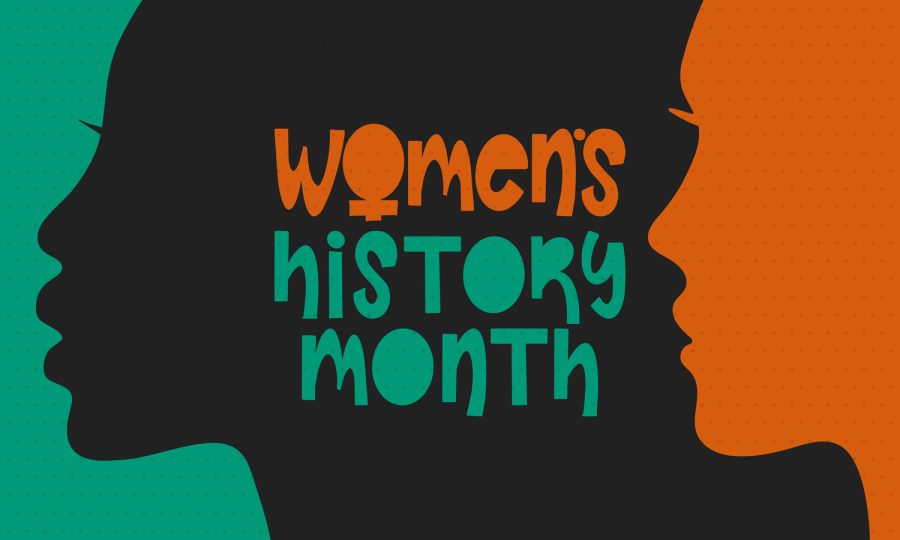Ops Blog | How can we improve the future for women?
March celebrates Women’s History Month. The Daily Iowan opinions staff on changes to improve the future for women.
March 26, 2023

Accessible legal protection
One way we can improve women’s future increase the number of resources for legal protection.
Making resources more readily available for women could go a long way to providing a safer environment. Women should be able to go for a walk without fear of being attacked. We live in a world where women are constantly preyed upon with laws that are rigged against them.
This would take a lot of social reform and expenditure but if women are to be truly valued and “kept safe,” they need to be given the tools to do so.

Pay equity
One change that could make the future better for women revolves around pay equity.
Women have been on the disadvantaged side of the workforce. According to The United Nations Entity for Gender Equality and the Empowerment of Women, the existing gender gap has not changed or shifted in several years, around 30, to be exact.
One way to improve this inequity is to give our undivided support for organizations and local communities that work towards securing pay equity for women and girls. By offering support and getting involved, women and girls around the world will be able to achieve the work they work incredibly hard for.
Women should not be brushed to the side and deserve fair and equal opportunity to succeed.

Domestic violence awareness
Domestic abuse is an issue that needs to be more widely talked about in Iowa alongside resources to improve the well-being of women in Iowa.
According to the National Coalition Against Domestic Violence, 35.3 percent of women in Iowa experience violence, sexual violence, or stalking with an intimate partner during their lifetime. A resource that needs to be spread to ensure safety to women in these circumstances is the Iowa Safe at Home program.
Launched in 2016, this program provides survivors with substitute addresses for their safety. This ensures that their abusers can’t re-locate victims. Available 24/7 to help is also the Iowa Victim Service Call Center. This number can be reached out at 1-800-770-1650 or by texting IOWAHELP to 20121.
Speak out against domestic violence. As men, we must use our privilege to boost the voices of women who need to be heard.

More role models
A role model. Everyone needs a role model, or someone to look up to.
Often, I take for granted the many people in my life that were similar to me, that I could more easily look up to. There shouldn’t be a need to break through the glass ceiling, as it should already be broken. A path, any path, should be blazed, leading the next generation of women to the jobs and lives they want.
Although we don’t live in this world, where everyone already has the perfect role model, we can still do something to change that. If you can’t find a role model, be one. It is never too late to be the inspiration needed for the next generation.
In the time being, there are always people to look up to. They may not fit, they need to be like you, or someone you can see yourself as, but they can help guide you to the place you and many others deserve to be.
You can’t always have the easy road, so it always helps to make the road easier for the next travelers.

Amplifying female achievements
The baseless belittling of the achievements of women is a cultural attitude that must change.
We have seen it throughout history and continue to see it today. The women who helped the U.S. put a man on the moon were deliberately burdened by their own supervisors. Ruth Bader Ginsburg was one of 9 women in a class of 500 men at Harvard Law School and was asked by the dean of Harvard Law why she was at the school and “taking the place of a man.”
These days, a post about women’s sports by a major sports news organization is sure to be flooded with comments of “Who?” and “We don’t care.” It is an unfortunate truth that many people will look for every excuse they can to maintain their deluded belief that women are the inferior sex, and that is an outdated attitude that must change to achieve justice.

Improved representation
It is no secret that there is a double standard when it comes to parenting.
If a woman works a lot, she is criticized for not spending more time with her children. If a man works a lot, he is praised for supporting his family. This is a cultural attitude that needs to change for women to be seen as equals in the workplace, regardless of if they have children.
Something that could put this cultural shift into motion would be parenting advertisements centering both men and women. If popular culture displays both parents sharing parenting responsibilities, it will become normalized. I do believe this stigma has begun to change over the years, but there is still work to be done.

Recognizing privilege
One change that could make the future better for women, would be the implementation of a policy that requires men to participate in consciousness activities that inform them of their privileges.
Evidently, men have certain privileges over women — such higher overall pay, unobstructed participation in the labor force, etc. .— that they do not realize they have. This lack of awareness is what leads to unequal opportunities for women; specifically, it makes it so that the unacceptable gender disparities today are overlooked and not considered a problem.
Implementing consciousness and awareness-raising activities for male privilege will not only address the, but I believe that it will also positively change men’s attitudes towards women in household scenarios, workplace scenarios, public scenarios, etc.
Overall, the future would be better for women if policies were implemented to help people acknowledge that women face certain obstacles that men do not.

Investments in social programs
Greater investment in social services researching and targeting the causes of rape culture, toxic masculinity, and other factors contributing to gender-based oppression could improve the future for all women in the U.S.
Because of the wide variety of cultural, political, and economic needs around the globe, it seems reductive to claim one solution would solve global issues facing women. In the U.S., gender-based violence, repressive policies, and inequitable workloads both in the home and in the workplace disproportionately harm feminine presenting people.
This is especially true for Americans who are trans and/or Black women. American education systems and media sources could do a better job at equipping everyone with the tools to be informed and proactive against gender inequalities and violence.
Change begins with investment in social programs working to uplift all women navigating the overlapping struggles of a simultaneously patriarchal, white supremacist world.

Improving wage disparities
This women’s history month, it is imperative to highlight the wage gap between men and women.
On average, women earn 82 percent of what men earn. This has remained stagnant since the early 2000s. The wage gap can be explained by the fact that working women are still seen as primary caretakers and must take extended time to take care of children.
It is thus in the interest of policymakers to pass a maternity leave bill to close the wage gap as it will allow for women to become more financially independent.

Birth control education
Women shoulder much of the burden during heterosexual sex. They are at higher risk than men for STDs, STIs, and pregnancy. Even though 95 percent of Americans have sex before marriage, there’s still a push against education about different forms of birth control and protection.
Seven of the 10 states with the highest teen pregnancy rates mandate abstinence-only sex education. Meanwhile, abstinence-only sex ed is not required in any of the 10 states with the lowest teen pregnancy rates.
It’s no secret that kids are expensive, and it’s also no secret that most of the burden of taking care of kids is placed on women. On top of having to carry a growing fetus around for nine months, women are often expected to stay home from work, put their careers on hold, and put their focus toward their newborn. By limiting unwanted pregnancies, we’re allowing more women to pursue their careers and education, all while building their wealth.
Columns reflect the opinions of the authors and are not necessarily those of the Editorial Board, The Daily Iowan, or other organizations in which the author may be involved.



